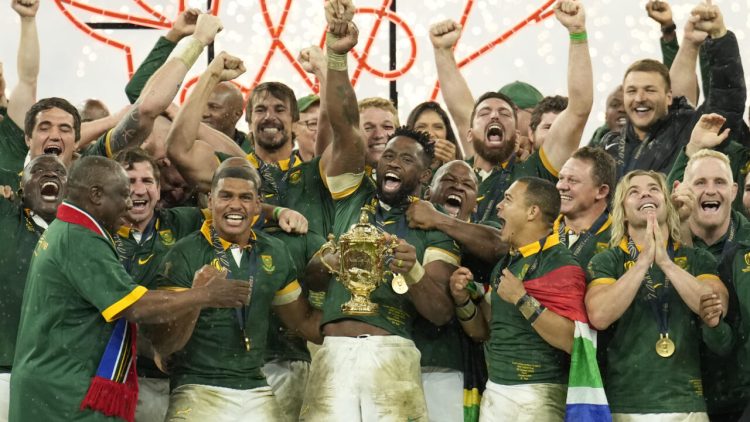Introduction
The Rugby World Cup is the pinnacle of the sport, where the world’s best teams compete for glory every four years. Historically, the tournament has been dominated by a handful of traditional powerhouses—New Zealand, South Africa, England, and Australia—whose dominance has been well-established through multiple World Cup victories and consistent top-tier performances. However, with the 2023 Rugby World Cup on the horizon, a new wave of challengers has begun to emerge, signaling that the established order may be on the verge of disruption.
The question that fans, analysts, and players alike are asking is: Which teams are most likely to break through the stranglehold of these rugby giants and claim the World Cup title? With the rise of teams like France, Ireland, and Wales, the upcoming tournament promises to be one of the most unpredictable and thrilling yet. In this article, we will explore the teams poised to challenge the dominance of the rugby heavyweights and assess the key factors that could lead to their success.
I. The Traditional Powerhouses: Why Are They So Dominant?
Before we can identify the potential challengers, it is important to understand why teams like New Zealand, South Africa, England, and Australia have been so dominant in World Cup history. These teams have established themselves not just through their successful World Cup campaigns, but also through their consistent performance in international rugby tournaments.
A. New Zealand – The All Blacks
New Zealand, or the All Blacks, are arguably the most successful team in Rugby World Cup history. With three World Cup titles (1987, 2011, and 2015), the All Blacks have set the standard for rugby excellence. Their formidable combination of skill, speed, and tactical intelligence has made them the team to beat. New Zealand’s success is built on a deep rugby culture, a robust grassroots development system, and the ability to adapt to changing playing styles.
B. South Africa – The Springboks
South Africa’s physicality, strong forward play, and disciplined defense have made them one of the most formidable teams in rugby. The Springboks have won the World Cup three times (1995, 2007, and 2019), with their 2019 victory being particularly notable after their victory over England in the final. South Africa’s success has been built on powerful and versatile players who excel in both the set piece and open play.
C. England – The Red Roses
England’s rugby legacy is marked by its solitary World Cup victory in 2003, when they triumphed in Australia. Over the years, England has consistently been one of the top-ranked teams in the world, with a well-organized, tactical approach to the game. Under Eddie Jones, the England team has improved dramatically, producing a number of standout performances, including reaching the 2019 final.
D. Australia – The Wallabies
Australia is another rugby powerhouse with two World Cup victories (1991 and 1999). The Wallabies have a reputation for playing a fast, attacking brand of rugby and have produced some of the sport’s greatest players. With a rich rugby heritage and a competitive domestic league, Australia remains a perennial contender at the World Cup.
II. The Rising Challengers: Who Can Break the Mold?
While the traditional powerhouses are always favorites to win, the 2023 Rugby World Cup is shaping up to be one of the most competitive tournaments in history. Several teams have the potential to break through the dominance of New Zealand, South Africa, England, and Australia. Here are the top contenders who could disrupt the established order:
A. France – The Hosts Ready to Shine
As the host nation for the 2023 Rugby World Cup, France is under immense pressure to deliver a strong performance. However, the French team has been steadily improving in recent years, and their development has been promising. With a solid mix of experienced players and dynamic new talent, France is poised to make a serious run at the title.
- Key Strengths:
- Home Advantage: Playing on home soil gives France a significant advantage in terms of fan support and familiarity with the conditions.
- Team Depth: France boasts a deep squad with stars in every position, including influential players like Antoine Dupont, who is regarded as one of the best scrum-halves in the world.
- Creative Style: France has always been known for its flair and creativity, with an attacking game that can break down even the toughest defenses.
- Challenges:
- France’s inconsistency has been a historical problem. While they can be brilliant on their day, they have occasionally failed to deliver when it matters most.
B. Ireland – A Rising Giant Ready for Glory
Ireland has been one of the most consistent teams in the world over the past decade. Their World Rugby rankings have been consistently high, and they have a strong record in the Six Nations Championship. However, Ireland has yet to win a World Cup, and many believe they are due for a breakthrough.
- Key Strengths:
- Tactical Precision: Under head coach Andy Farrell, Ireland has become known for its well-organized, tactical approach to rugby. Their ability to control the tempo of the game and make accurate, strategic decisions is one of their key strengths.
- Player Quality: Ireland has a strong pool of experienced players, including captain Johnny Sexton, who is one of the best fly-halves in the world.
- Challenges:
- Ireland’s World Cup record is one of their main obstacles. They have often been knocked out in the quarter-finals, and breaking the mental barrier to reach a semi-final or final will be critical for them.
C. Wales – The Dark Horses
Wales may not be the first team that comes to mind when thinking of World Cup contenders, but they have consistently punched above their weight in recent tournaments. They reached the semi-finals in 2011 and 2019, and their strong defensive structures make them difficult to break down.
- Key Strengths:
- Defensive Resilience: Wales is known for its disciplined defense, which is hard to break through. Their ability to absorb pressure and capitalize on opposition mistakes has made them a difficult team to beat.
- Leadership: Players like Alun Wyn Jones and Leigh Halfpenny bring invaluable experience to the team, and their leadership will be vital in the high-pressure moments of a World Cup.
- Challenges:
- Wales lacks the depth of some of the bigger teams, and injuries to key players could have a significant impact on their chances of success.
D. Argentina – The Southern Hemisphere Surprise
Argentina has long been a tough opponent for any team, and their performance in the 2023 Rugby World Cup could be a turning point for the team. Having recently reached the semi-finals of the 2007 World Cup, Argentina is always dangerous, and with the rise of key players, they could cause an upset.
- Key Strengths:
- Physicality: Argentina’s strength lies in its powerful forwards, who excel in the scrum and maul.
- Passion: Argentina’s players are known for their relentless determination and passion, which makes them dangerous under the pressure of a World Cup.
- Challenges:
- Argentina’s lack of consistency in the upper echelons of international rugby is a major issue. They have the potential to beat anyone, but they also struggle to maintain that level against the very best teams.

III. Key Factors to Watch: What Will Determine Success in 2023?
For any of the emerging teams to break the dominance of the traditional rugby powerhouses, several factors will need to align. These include:
- Team Chemistry and Depth: Teams with a deep squad and solid team chemistry will have the edge in a tournament that spans several weeks. Injuries are inevitable, and the ability to rotate players without losing quality will be crucial.
- Tactical Adaptability: As seen in previous World Cups, teams that can adapt their tactics to different opponents are more likely to succeed. Whether it’s adjusting to the power game of South Africa or the fast-paced attack of New Zealand, flexibility is key.
- Star Performances: The World Cup has often been decided by moments of individual brilliance. Teams that can rely on a standout player to deliver when the pressure is on will have a distinct advantage.
Conclusion
As we look forward to the 2023 Rugby World Cup, it is clear that the competition will be fierce. While the traditional powerhouses remain the favorites, teams like France, Ireland, Wales, and Argentina are poised to challenge the status quo. With a blend of new talent, tactical evolution, and unrelenting determination, these teams could very well break the stranglehold of the rugby giants and secure their place in history. The stage is set for an exciting and unpredictable World Cup, and the question remains: which team will rise above and claim the ultimate prize?






























Discussion about this post